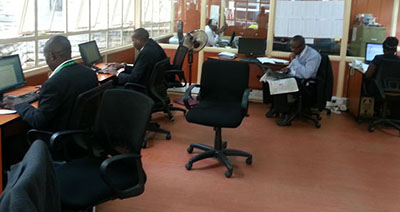News coverage of the Kenyan Parliament elected in March 2013 is off to a rocky start. The press last week was kicked out of the media center in the National Assembly, and although the speaker tried to make assurances that overall access won’t be affected, journalists are wary.
The clerk of the National Assembly, Justin Bundi, on Wednesday ordered journalists to vacate the media center and told them the press may only cover Parliament when invited, according to news reports. The clerk ordered computers and furniture removed to convert the room for MPs’ use. Interviews outside of the room will also be banned, and only the national broadcaster will be allowed to routinely cover parliamentary sessions, the clerk said. “We’re not creating residences for journalists in Parliament,” Bundi was cited as saying in news reports.
However, Speaker Justin Muturi dismissed the clerk’s statement that the press needs an invitation for parliamentary coverage, the private daily Star reported Thursday. Muturi said alternative accommodation would be found for the press, despite the fact the U.S. government expressly donated 2.5 million Kenyan shillings (US$29,440) to fund the media center, according to news reports.
The Kenyan press has used the media center to file stories on parliamentary proceedings for the past three years, local journalists said. With the new expanded federal government system in place, as directed by the 2010 constitution, space has become an issue, Nation Parliament Editor Njeri Rugene told me.
But Njeri and some other journalists also said they suspect an ulterior motive for kicking the journalists out of the center. “It is just an excuse to intimidate the press,” Kenya Editor’s Guild Chairman Macharia Gaitho told me. The guild was to conduct a consultative meeting with media houses Monday to determine whether to organize a protest media blackout of Parliament, he said. Some local journalists believe robust coverage of MPs’ bid to increase their salaries–one of their first acts–has infuriated some legislators. Two weeks prior to the clerk’s directive, the leader of the majority party, Aden Duale, threatened vaguely to “teach the media a lesson” over coverage of the pay saga, news reports said.
The executive branch has not been much kinder to the press. In May, the statutory Media Council of Kenya ordered the Star to publicly apologize for an article published in February 2012 that claimed now-President Uhuru Kenyatta was not fit for office, according to news reports. In the same month, Kenyatta’s deputy, William Ruto, threatened to sue the Sunday Nation for allegedly false reporting over expenses the deputy incurred using a luxury jet to visit four African countries earlier in May.
Some local journalists say they are wary of the new administration, and unsure whether media freedoms instituted by former President Mwai Kibaki will be clipped. Kibaki took over in 2002 from Daniel Arap Moi, who in his 24-year rule allowed only the state broadcaster on air. Kibaki oversaw the entry of private broadcasters to the airwaves and a flurry of other press freedoms–culminating in one of the most vibrant media scenes on the continent. In early May, Kenyatta pledged “to fight any attempts to gag the media or any other action that will cripple them,” during the opening of a journalists’ convention hosted by the the Media Council of Kenya, according to news reports.
